
Gastric sleeve surgery in Turkey is considered to be safe and is one of the most popular bariatric surgeries in abroad. This surgery reduces the risk of obesity-related health problems such as heart disease, infertility, cancer, high cholesterol, and high blood pressure, while also helping patients lose weight. It is typically recommended for individuals with a body mass index (BMI) of 35 or more and is also known as vertical sleeve gastrectomy.
Once an individual has decided to have gastric sleeve surgery, they often search for the best location to have the procedure. Turkey is a popular choice due to its affordable prices and the availability of high-quality clinics with experienced doctors who can provide the best results.
Average cost of a gastric sleeve in Turkey is 4000 USD (3500 EURO or 3000 pounds), which is much more affordable than other countries.
This blog provides information on getting gastric sleeve ( sleeve gastrectomy ) in Istanbul, Turkey, including reviews from previous patients, before and after photos, and a price comparison with other countries. All-inclusive gastric sleeve surgery Turkey packages are also available.
🇹🇷 Gastric Sleeve Surgery in Turkey
Turkey is known for its world-class healthcare, modern technology, and expert surgeons specializing in Gastric Sleeve and bariatric procedures. Patients worldwide choose Turkey for its medical expertise and comprehensive care. Many clinics offer packages that include consultations, surgery, hospital stay, post-operative care, and follow-up, often covering airport transfers, accommodation, and translators to ensure a smooth experience for international patients.
| Detail | Information |
|---|---|
| Eligibility | +35 BMI |
| Processing time | 1 hour |
| Surgical procedure | Yes |
| Stitch | Dissolvable |
| Anesthesia type | General |
| Incision | 5 |
| Hospital Accreditation | ISO |
| Recovery time | 7 days |
| Accommodation | 7 days |
| Cost | 4000 USD |
| Package | All Inclusive |
📸 Discover Incredible Transformations with Our Gastric Sleeve Surgery in Turkey!
Explore our Before & After gallery to see real patient results and witness how this life-changing procedure has helped individuals achieve their weight loss goals. Each story showcases the remarkable journey from obesity to a healthier, more confident life. Let these success stories inspire your own transformation!





✅ What are the Advantages of Having Gastric Sleeve Surgery in Turkey?
Affordable Costs: Significantly lower prices compared to other countries while maintaining high-quality care.
Experienced Surgeons: Access to skilled and internationally trained bariatric surgeons.
World-Class Facilities: Modern hospitals equipped with the latest technology.
Comprehensive Packages: Many clinics offer all-inclusive packages that cover consultations, surgery, hospital stay, post-op care, and even airport transfers.
Medical Tourism Expertise: Turkey is a leading destination for medical tourism, offering services tailored to international patients, including translators and personalized care.
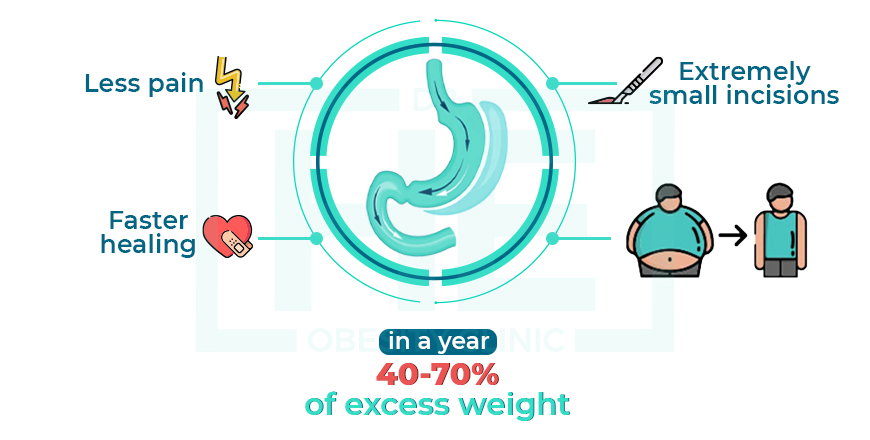
📅 Plan Your Trip to Turkey for a Gastric Sleeve
Consultation: Schedule an online consultation with the surgeon to discuss your medical history and goals.
Book Your Trip: Arrange flights and accommodation. DR Hasan Erdem offers packages including accommodation and airport transfers.
Prepare Documents: Gather medical records and ensure you have everything ready for your trip.
Surgery Day: Arrive at the clinic for pre-op evaluations and surgery.
Recovery: Stay in the hospital for post-op care, typically 2-3 days.
Post-Op Care: Follow up with your surgeon and plan your recovery journey.


To Meet Online with Prof. Dr. Hasan Erdem 24/7 Make an Appointment
🌟 Reasons for the Popularity of Gastric Sleeve in Turkey 🌟
The popularity of Gastric Sleeve surgery in Turkey is due to several factors: experienced surgeons, advanced medical facilities, affordable treatment costs, and comprehensive care packages. Additionally, Turkey’s strict adherence to international healthcare standards and its reputation for medical tourism make it a top choice for patients worldwide seeking weight loss solutions.
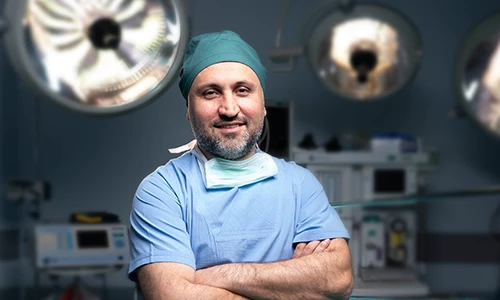
Dr. Hasan Erdem is an internationally renowned bariatric surgeon in Istanbul, Turkey. With over 15 years of experience, he is a specialist in weight loss procedures such as gastric sleeve, gastric bypass and gastric banding. Defined for his expertise and outstanding results, Dr. Erdem guarantees its patients’ profits and well-being by offering personalized care and comprehensive follow-up.
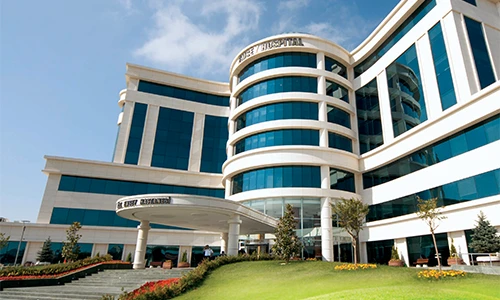
Safe hospital treatment ensures that all medical procedures, including surgeries and post-operative care, are performed in a controlled and sterile environment. Hospitals follow strict safety protocols, using advanced technology and highly trained staff to minimize risks and ensure patient well-being. This approach guarantees a secure and professional setting, providing peace of mind for patients undergoing treatment.

State-of-the-art medical equipment refers to the most advanced and innovative tools and technology used in healthcare today. These cutting-edge devices ensure precise diagnostics, safer procedures, and more effective treatments. By utilizing the latest technology, hospitals and clinics can provide higher quality care, reduce recovery times, and improve overall patient outcomes.
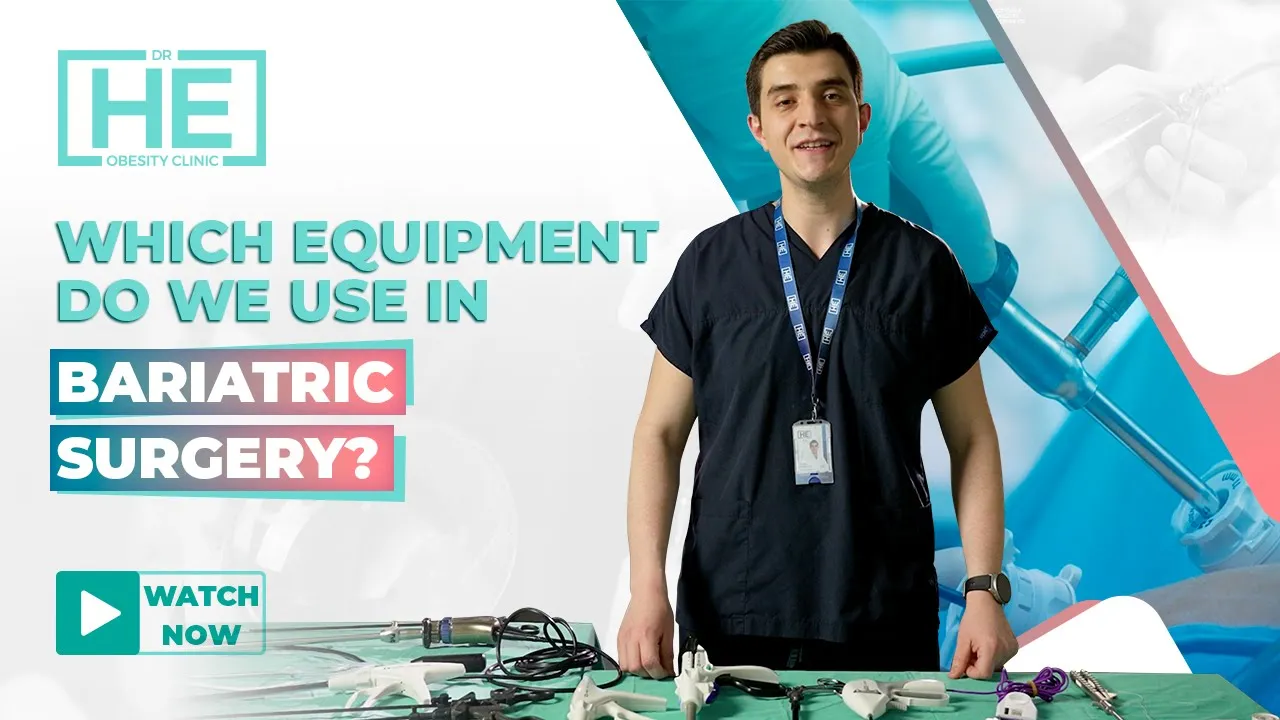


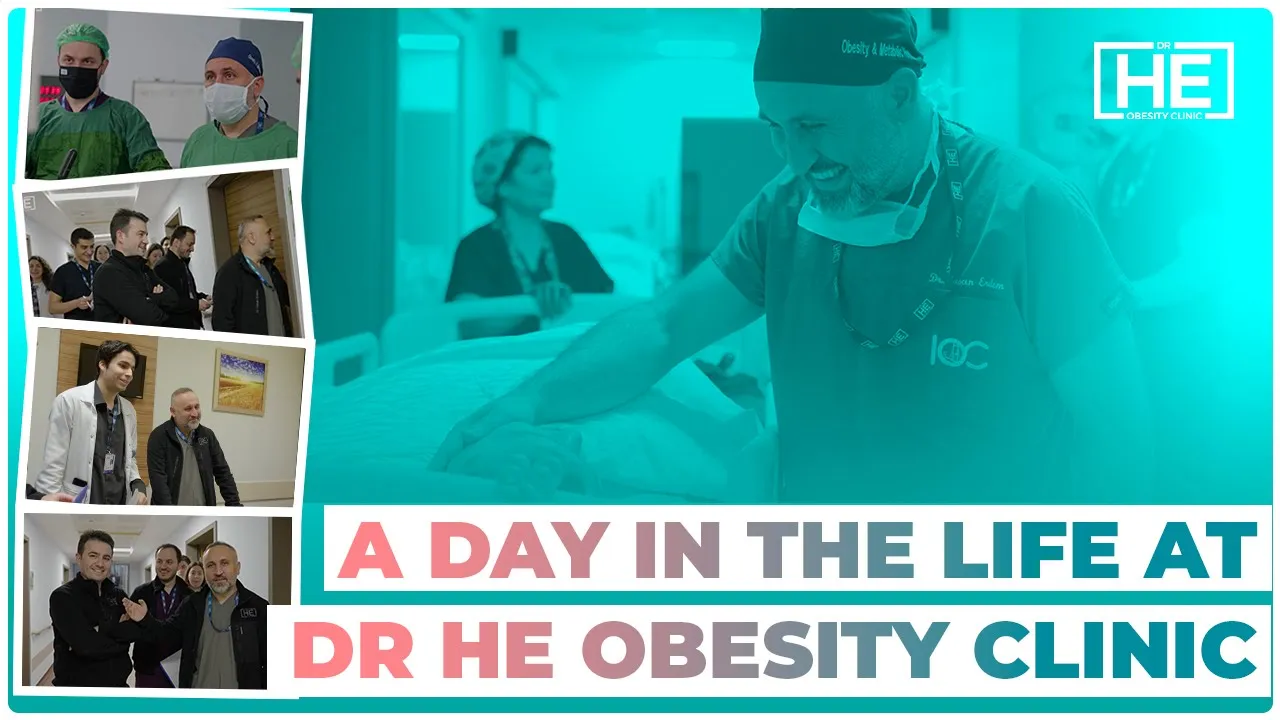
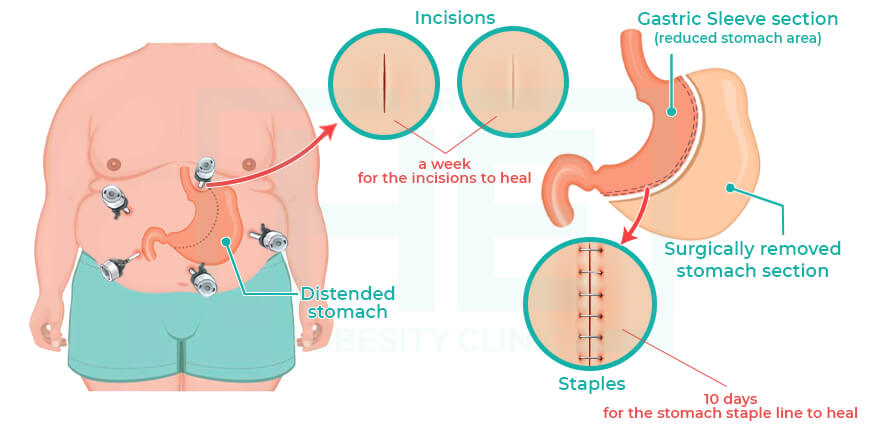
How is Gastric Sleeve Surgery Performed?
Gastric sleeve surgery is a minimally invasive procedure where a large portion of the stomach is removed, leaving a smaller, sleeve-shaped stomach. This reduces the stomach’s capacity, helping patients eat less and feel full more quickly. The surgery is typically done laparoscopically, using small incisions and specialized tools, which minimizes scarring and recovery time. After the procedure, the digestive system continues to function normally, but the reduced stomach size leads to significant weight loss over time.
Recovery After Gastric Sleeve Surgery
Hospital Stay: After surgery, patients stay in the hospital for 2-3 days under close monitoring to ensure no complications.
Diet Progression: Initially, patients start with a liquid-only diet, then gradually move to pureed foods, soft foods, and eventually solid foods over a few weeks.

Pain Management: Mild discomfort is normal, and prescribed pain medications help manage it during the first few days.
Follow-Up Appointments: Regular follow-up visits with the surgeon ensure proper healing and weight loss progress.
Physical Activity: Light activities can begin after the first week, but strenuous exercise should be avoided for about 4-6 weeks.
Long-Term Lifestyle: Patients are advised to adopt a healthy diet, take supplements as needed, and maintain regular physical activity to support long-term weight loss success.
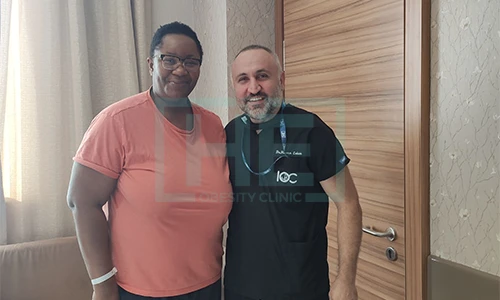
Who is Eligible for Gastric Sleeve in Turkey?
Individuals with a BMI of 35 or higher who struggle with obesity-related health issues, such as diabetes, hypertension, or sleep apnea.
People with a BMI of 40 or higher who have not had success with diet and exercise alone.
Patients who are physically and mentally healthy enough to undergo surgery and commit to lifestyle changes after the procedure.
How many pounds can be lost with Gastric Sleeve?
In general, after gastric sleeve surgery, most patients become perfectly thin, with a weight loss rate of about 70% of excess weight. The majority of weight loss occurs in the first year, and there may still be additional weight loss in the year after, but the weight normally remains stable.
For example, a patient who is 160 cm tall and weighs 124 kg has an ideal upper weight limit of 64 kg, with an excess weight of 60 kg. This means that the patient loses 70% of their excess weight, which amounts to 42 kg, bringing their weight down to 82 kg.
It is almost impossible not to lose weight after gastric sleeve surgery. However, while some patients are able to achieve their ideal weight, others may experience insufficient weight loss. In follow-up reports of large patient groups, the rate of long-term weight loss is about 85-90%. A small number of patients may experience repeated weight gain over a long period of time, but the chances of returning to the old weight are only 1%.
Gastric sleeve surgery, like all obesity operations, does not promise a specific weight loss value. However, closed gastric sleeve surgery substantially reduces appetite by limiting the amount of food that can be eaten during a meal.
Patients who begin to lose weight immediately see a positive shift in their mindset. Breaking the cycle of restricted daily life, bad diet, and inactivity in a short period of time makes it easier to adopt a healthier lifestyle. As a result, patients who maintain a regular daily routine after surgery, including a balanced diet and physical activity, achieve better results.
What are the differences between Laparoscopic and Endoscopic Gastric Sleeve Surgery?
Endoscopic Gastric Sleeve Surgery is a method in which a certain part of the stomach is endoscopically reduced, without incision, unlike traditional surgery. After the procedure, patients can begin a healthy weight loss process, and permanent results can be achieved quickly. On average, patients experience a weight loss of 17-20% at the end of the first year. This procedure not only helps achieve the desired aesthetic appearance but also prevents many serious obesity-related diseases.
It is important to note that Endoscopic Gastric Sleeve surgery is performed by shrinking the stomach endoscopically, which involves entering the stomach through the mouth, without any incisions.
In contrast, Laparoscopic Gastric Sleeve surgery is a surgical method that enables patients to recover faster and with less discomfort than open surgery. Laparoscopic surgery is less invasive and more comfortable than traditional surgery. Patients who undergo this procedure recover faster and experience less discomfort during the healing process. Furthermore, laparoscopic surgery reduces the duration of the operation, as well as the risk-to-benefit ratio.

💸 Gastric Sleeve Surgery Cost in Turkey 2025
The cost of gastric sleeve surgery in Turkey for 2025 typically ranges from $3,500 to $5,500, depending on the clinic, surgeon, and package inclusions. These packages often include the surgery, hospital stay, pre-surgery consultations, post-operative care, and additional services like airport transfers and accommodation, making Turkey a cost-effective option for high-quality weight loss surgery.
How Much is a Gastric Sleeve Surgery in Turkey?
In Turkey, the average cost for gastric sleeve surgery in Istanbul is €3,500.00 or £3,000.00 for an all-inclusive package. The minimum price is €3,000.00, and the maximum cost is €5,000.00. However, the cost may vary from one clinic to another, and several other factors can impact the average cost of gastric surgery in Turkey.
Ultimately, the cost is highly dependent on the patient’s condition in many cases, and consulting with an experienced provider is often the best option.
🌍 Gastric Sleeve Surgery Prices by Country
 Turkey Turkey | $3,500 – $5,500 |
 Mexico Mexico | $8,500 – $11,000 |
 USA USA | $15,000 – $20,000 |
 UK UK | £9,500 – £12,000 |
 Germany Germany | €9,500 – €12,500 |
 Spain Spain | €10,000 – €13,500 |
What is the Prices of Gastric Sleeve Surgery in Different Countries?
The cost of sleeve gastrectomy may vary depending on several factors, including the experience of the surgeon, the quality and quantity of materials used in the operation, examination costs, and hospital costs. Private hospitals typically charge higher prices for gastric sleeves.
Although pricing may differ in various parts of the world, the most important consideration for this operation should be achieving a healthy result rather than the cost. Exchange rate differences and conditions in different countries/regions can affect prices, but similar pricing is generally observed.
Gastric Sleeve in Turkey vs UK
If you’re looking for gastric sleeve surgery, but can’t afford the high costs of UK clinics, consider the benefits of getting the procedure in Turkey. While there are significant differences in cost, the cost of standard equipment is about 3.500£ and the quality of care is much higher.
While UK surgeons have the same standards of care, they don’t necessarily follow the same ones, and are likely to use inferior equipment and disposable instruments.
Gastric sleeve surgery abroad requires patients to spend four days in hospital after their surgery. Following the operation, patients are required to follow a special diet for the first two to four weeks.
Patients are encouraged to avoid solid foods until they’re accustomed to their new stomach. In the UK, patients must wait for at least two years before they can have the procedure.
In Turkey, gastric sleeve surgery costs are significantly lower than the UK, and NHS patients can sign up for the procedure on the NHS.
In Turkey, the cost of gastric sleeve surgery is 55% lower than in the UK. Patients can pay in instalments or in cash. However, gastric sleeve surgery procedure in Turkey is exactly the same as in the UK.
Typically, the cost of a gastric sleeve in the UK is 9.500£, but in Turkey, it’s possible to find a gastric sleeve cost of 3.500£, which is considerably lower than the price of the same procedure in a UK private clinic. And also, undergoing gastric sleeve surgery in Istanbul, Turkey is straightforward. Most major UK airports have flights running regularly in Istanbul, Turkey.
Why does Gastric Sleeve Surgery Cost in Turkey Cheap?
The cost of Gastric Sleeve Surgery in Turkey is lower due to a combination of factors. Operating costs, including wages and equipment, are generally cheaper compared to countries like the USA or UK. Favorable exchange rates also make the surgery more affordable for international patients. Additionally, the Turkish government supports medical tourism, which helps clinics reduce costs while maintaining high standards of care. The high volume of patients coming to Turkey for such procedures also allows clinics to offer competitive pricing without compromising on quality.
Why is Turkey the most affordable country in Europe for gastric sleeve?
Gastric sleeve, which is one of the most expensive operations among obesity surgeries, is performed at an affordable price in Turkey. Because there are many doctors and clinics who are experts in this field in Turkey. The supply-demand flow is plentiful. If you are planning to come to Turkey from abroad for gastric sleeve surgery, make sure you make the right choice. Turkey is a budget-friendly country in healthcare.
Does Health Insurance Pay for the Gastric Sleeve Surgery?
Whether health insurance covers gastric sleeve surgery depends on the specific insurance plan and country. In many cases, health insurance may cover the procedure if it is deemed medically necessary for treating obesity and related health conditions like diabetes or hypertension. However, patients typically need to meet certain criteria, such as having a BMI over a certain threshold and proving that other weight loss methods have failed. It’s essential to check with your insurance provider for the specific terms, as some plans may not cover bariatric surgeries or may require pre-authorization.
All Inclusive Packages
All Inclusive Packages
All Inclusive Packages
Gastric Sleeve in Turkey Reviews
The gastric sleeve is a popular weight loss surgery option for individuals who are obese. Turkey is a highly regarded medical tourism destination for gastric sleeve procedures. Reviews of gastric sleeve procedures in Turkey are generally positive, with many patients reporting significant weight loss and improved health.
The majority of patients express satisfaction with their results, and many report a noticeable improvement in their overall quality of life. Furthermore, gastric sleeve surgery in Turkey is often more affordable than in other countries, making it a feasible choice for many individuals. Overall, both patients and medical professionals in Turkey hold gastric sleeve procedures in high regard.

"I came from Germany . I had my Surgery with Dr. Hassan Erdem. I am very satisfied. He was very nice and friendly. He did good Job. The Hospital was very good and the people are nice. They always checked me up. I almost lost 5 kilos in 6 days."

“Had my operation in may 20th it’s now July 17th I’ve lost 20 kilos best thing I ever done. Feel healthier and happier thanks to all the staff an doctors for their help it was much appreciated will be back to visit soon. Thank you so much for everything."

“The best decision I made in my life was having this operation. I had my surgery 5th of July 2018 and went into it weighing 118 kilos and it’s been just over a year I’m 74 kilos. Worth every single penny I spent and the doctors are so motivating and supporting"

“Thank you for everything doctor Hasan. I had gastric sleeve 7.04.2019. I lost 43 kilos. After the surgery, i felt a little pain but that was worthy. Dr Hasan and his team gave me a new life. Now, As if I never lived before. Thank Dr. HE and his team."

"I was searching for this operation for years. I found Turkey and Turkey was a good option. Before the surgery, I was afraid. But Dr. Hasan Erdem and his team helped me a lot. Now, I lost 13 kilos in one month.. I am getting better everyday."

"I was 120kg and now 75kg, it's Dr. Hasan and his team's miracle. From start to end everything is perfect. They always write to me and ask about my health per week. I made a good decision. Of course, I was worried and I was afraid but their energies were wonderful."
Is it Safe To Have A Gastric Sleeve Surgery in Turkey?
Yes, it is generally safe to have Gastric Sleeve surgery in Turkey. The country is home to many internationally accredited hospitals and highly experienced bariatric surgeons. Turkish clinics follow strict medical standards and offer state-of-the-art facilities equipped with modern technology. Additionally, the country’s growing reputation as a medical tourism hub ensures that clinics prioritize safety and quality care for international patients. However, it’s important to thoroughly research and choose a reputable clinic and surgeon to ensure the best outcomes.
How to Reach Turkey?
Reaching Istanbul is easy with two major international airports: Istanbul Airport (IST) and Sabiha Gökçen Airport (SAW). Both airports offer direct flights from cities worldwide, making Istanbul highly accessible. Istanbul Airport (IST) serves as the main hub, while Sabiha Gökçen (SAW) is located on the Asian side of the city, providing another convenient option for travelers. After landing, you can reach the city center via taxis, airport shuttles, or public transport from both airports.
Do I Need to Stay in Turkey After Gastric Sleeve Surgery?
Yes, after Gastric Sleeve surgery, you will need to stay in Turkey for a short period to ensure proper recovery and follow-up care. Typically, patients are advised to stay for about 7 to 10 days. This allows time for post-operative monitoring, ensuring there are no complications, and attending follow-up consultations with your surgeon before returning home. Your clinic will guide you on the exact duration based on your individual recovery progress.
Places to Visit in Turkey
- Istanbul
- Izmir
- Antalya
- Muğla
- Ankara
Istanbul:
Istanbul is a vibrant city with a rich history and a unique blend of cultures. Here are some must-visit places to add to your list when exploring Istanbul:
Hagia Sophia: Originally built as a church in the 6th century, this iconic building has served as a mosque and museum throughout its history. Now a UNESCO World Heritage site, visitors can admire the impressive architecture and see the stunning mosaics and frescoes inside.
Topkapi Palace: Home to the Ottoman sultans for centuries, this palace offers a glimpse into the opulent lifestyle of the rulers. Highlights include the Harem, the Imperial Treasury, and the lush courtyards and gardens.
Grand Bazaar: A shopper’s paradise, the Grand Bazaar is one of the world’s oldest and largest covered markets. With over 4,000 shops selling everything from jewelry to spices, it’s easy to get lost in the maze-like alleys.
Sultan Ahmed Mosque (Blue Mosque): One of Istanbul’s most famous landmarks, this mosque is known for its six minarets and stunning blue tiles that adorn the interior.
Bosphorus Cruise: Take a scenic boat tour along the Bosphorus Strait to enjoy panoramic views of Istanbul’s skyline and iconic landmarks, including the Bosphorus Bridge and the Maiden’s Tower.
These are just a few of the many amazing places to explore in Istanbul. Whether you’re interested in history, culture, or simply enjoying the bustling atmosphere of this vibrant city, there’s something for everyone.
Izmir
Izmir is a vibrant city located on the Aegean coast of Turkey, known for its rich history, beautiful beaches, and vibrant culture. Here are some of the best places to visit in Izmir:
Kemeralti Bazaar: This sprawling market is a shopper’s paradise, with a maze of alleys selling everything from spices to souvenirs. It’s a great place to bargain and haggle for unique finds.
Konak Square: This central square is home to the iconic clock tower, a symbol of Izmir. Visitors can relax in the park or enjoy a coffee at one of the nearby cafes.
Alsancak: This lively neighborhood is known for its nightlife, with bars, restaurants, and clubs lining the streets. It’s also home to historic buildings and museums.
Kadifekale: This ancient castle sits atop a hill overlooking the city and offers panoramic views. It’s a great place to explore and learn about Izmir’s rich history.
Karsiyaka: This waterfront neighborhood is a great place to enjoy the sea breeze and take a stroll. It’s also home to trendy cafes and restaurants.
Izmir has something for everyone, from bustling markets to tranquil beaches. These are just a few of the many amazing places to explore in this vibrant coastal city.
Antalya
Kaleici: This charming old town is the heart of Antalya, with narrow streets, Ottoman-era houses, and traditional shops and restaurants. It’s a great place to wander up the atmosphere.
Antalya Museum: This museum showcases the rich history and culture of the Antalya region, with exhibits spanning from the Paleolithic era to the Ottoman Empire. The highlight is the stunning collection of Roman-era statues and artifacts.
Hadrian’s Gate: This well-preserved Roman gate is a symbol of Antalya and marks the entrance to the old town. It was built in honor of the Emperor Hadrian, who visited the city in the 2nd century.
Duden Waterfalls: These stunning waterfalls are located just outside the city center and offer a refreshing escape from the summer heat. Visitors can walk behind the falls and take a boat ride to admire them up close.
Aspendos: This ancient Roman theater is one of the best-preserved in the world, with a capacity for over 15,000 spectators. It’s still used for concerts and performances today.
Antalya has so much to offer, from ancient ruins to beautiful beaches. These are just a few of the many amazing places to explore in this stunning coastal city.
Muğla
Muğla is a picturesque province located on the Aegean coast of Turkey, known for its beautiful beaches, turquoise waters, and historic sites. Here are some of the best places to visit in Muğla:
Bodrum Castle: This impressive castle sits atop a hill overlooking the harbor and offers panoramic views of the city. It’s also home to the Museum of Underwater Archaeology, which showcases the rich history of the region.
Oludeniz Beach: This stunning beach is known for its crystal-clear waters and is a popular spot for paragliding. Visitors can swim, sunbathe, and relax on the sandy beach.
Dalyan: This charming town is located on the Dalyan River and is home to the ancient city of Kaunos. Visitors can take a boat tour to see the Lycian rock tombs and mud baths.
Marmaris Castle: This well-preserved castle dates back to the 16th century and offers a glimpse into the region’s Ottoman history. Visitors can explore the castle and enjoy the panoramic views of the city.
Iztuzu Beach: This beautiful beach is located near Dalyan and is a protected nesting ground for loggerhead turtles. Visitors can sunbathe and swim while admiring the stunning scenery.
Datca: This charming town is located on the Datca Peninsula and is known for its traditional architecture, local markets, and stunning beaches. Visitors can explore the narrow streets and soak up the laid-back atmosphere.
Muğla has so much to offer, from ancient history to stunning beaches. These are just a few of the many amazing places to explore in this picturesque province.
Ankara
Anitkabir: This grand mausoleum is the final resting place of Mustafa Kemal Ataturk, the founder of modern Turkey. Visitors can pay their respects and learn about his legacy at the adjacent museum.
Ankara Citadel: This ancient fortress sits atop a hill overlooking the city and offers breathtaking views. It’s a great place to take a leisurely walk and explore the historic architecture.
Museum of Anatolian Civilizations: Housed in a restored Ottoman-era building, this museum showcases the rich history of Anatolia through its vast collection of artifacts, including pottery, sculptures, and jewelry.
Kocatepe Mosque: This stunning mosque is one of the largest in Turkey, with a capacity for over 20,000 worshippers. Its striking architecture blends modern and traditional elements, and the interior is adorned with beautiful calligraphy and intricate patterns.
Atakule Tower: For panoramic views of the city, head to this 410-foot-tall tower. From the observation deck, visitors can see all the way to the mountains on a clear day.
Hamamonu Historic District: This charming neighborhood is home to traditional Ottoman houses, narrow streets, and quaint cafes and shops. It’s a great place to wander and soak up the atmosphere of old Ankara.
Best Doctor for Gastric Sleeve in Turkey
One of the best doctors for Gastric Sleeve surgery in Turkey is Dr. Hasan Erdem, a highly experienced bariatric surgeon with a strong reputation for successful weight loss surgeries. With years of expertise in performing gastric sleeve and other bariatric procedures, Dr. Erdem is known for his personalized care, attention to detail, and commitment to patient safety. He practices at the Dr. HE Clinic, which offers state-of-the-art facilities and comprehensive pre- and post-operative care, making it a top choice for international patients seeking weight loss solutions in Turkey.

Frequently Asked Questions About Gastric Sleeve Surgery
Gastric sleeve surgery typically takes 1 to 2 hours. It is performed under general anesthesia, and most patients spend 1-2 days in the hospital for recovery.
While the procedure itself is not painful due to anesthesia, patients may experience mild discomfort during recovery. Pain is manageable with prescribed medications and usually subsides within a few days.
Yes, but the scars are small and minimal due to the laparoscopic technique used. These scars typically fade over time and are barely noticeable.
Although considered safe, potential risks include bleeding, infection, blood clots, and acid reflux. Rare complications like leaks at the surgical site may occur. Consulting an experienced surgeon minimizes these risks.
Absolutely. A strict post-operative diet is essential, starting with liquids and gradually transitioning to soft and solid foods. Long-term, a high-protein, low-carb diet is recommended to maintain weight loss and health.
If you are looking for the best private clinic for Gastric Sleeve surgery, you are in the right place! Dr. Hasan Erdem is an experienced doctor in gastric sleeve surgery. He has hundreds of successful references. He is the best doctor most preferred by European patients. All of the doctors working in our clinic are experienced doctors in gastric sleeve surgery. We have the best healthcare team in Turkey. We offer you the most successful surgeries in our comfortable clinic at the most affordable prices.
A special payment plan is prepared for you for gastric sleeve surgery in Turkey. You cannot pay for this surgery in installments. Payment is in advance. Payment is made by credit card or cash. The payment must be completed before the operation. You can use the most convenient payment method for you. If you buy the all-inclusive package, you can pay for accommodation and transportation in this way. Except for the amount specified by the clinic, you do not need to make any additional payments.
No, we do not offer any payment plan for gastric sleeve surgery in Turkey.
In order to make a decision on whether or not you should have Gastric Sleeve Surgery Turkey, you need to look at all of the details. These include the cost, the age limit for the surgery, whether or not you need insurance, and what the death rate is for the procedure. You should also take into consideration the risks and complications of the procedure.
If you are interested in undergoing gastric sleeve surgery, it is important to know whether your insurance plan will cover the cost.
The operation is not covered by insurance in Turkey, do not worry, you will not need to use your insurance as the operation will be carried out in a completely safe and cost-effective manner.
All you need to do while having a safe and affordable operation in Turkey will be to plan a pleasant trip.
Unfortunately, air tickets are not included in the package. As you can appreciate, economic conditions are quite volatile all over the world. For this reason, unfortunately, airfare is not included in our treatment packages.
However, we have VIP packages that include accommodation, transportation, fees for the necessary tests and examinations together with the examination and other expenses. By choosing these packages, you can avoid extra expenses that may occur.
Many of our visitors prefer these packages in order to protect themselves from extra expenses.




 Türkçe
Türkçe  Deutsch
Deutsch  Français
Français  Español
Español  Русский
Русский  Nederlands
Nederlands  български
български  Português
Português  Română
Română  العربية
العربية




